Overview
The article identifies ten cost-efficient trial designs that can significantly enhance the Medtech sector in Ecuador. It highlights how bioaccess® leverages innovative methodologies, including adaptive trial designs and collaborations with local institutions, to streamline research processes. This approach not only reduces costs but also improves the quality of medical evaluations, positioning Ecuador as a competitive hub for medical technology firms.
Introduction
In the rapidly evolving landscape of medical technology, Ecuador is emerging as a vital hub for innovative clinical research, primarily due to organizations like bioaccess®. With a strong emphasis on cost-efficient trial designs, bioaccess® is redefining how Medtech companies approach clinical studies in the region. Leveraging over 15 years of expertise in navigating local regulatory frameworks and clinical processes, bioaccess® is not only expediting the development of medical devices but also enhancing the quality and speed of clinical trials.
As the global demand for clinical trial services surges—particularly in Latin America—this article delves into the pioneering strategies employed by bioaccess®, including:
- Adaptive trial designs
- Early-feasibility studies
- Decentralized clinical trials
All aimed at creating a more streamlined and effective research environment. Through these innovative approaches, bioaccess® is not just reducing costs; it is paving the way for groundbreaking advancements in healthcare.
bioaccess®: Pioneering Cost-Efficient Trial Designs for Medtech in Ecuador
bioaccess® has established itself as a leader in Ecuador's Medtech environment by prioritizing cost-efficient trial designs for Ecuador that are tailored to the specific needs of medical technology firms. With over 15 years of experience, the organization capitalizes on its extensive knowledge of local regulatory frameworks and scientific procedures to expedite the development of medical devices. This strategic focus not only reduces costs but also enhances the quality and speed of medical studies, positioning Ecuador as an appealing destination for Medtech firms looking to conduct medical evaluations.
Recent statistics indicate that the global contract organization (CRO) market is projected to grow from approximately $40 billion in 2020 to more than $60 billion by 2024, reflecting a significant increase in demand for medical testing services across various sectors, including Medtech. This trend underscores the importance of cost-efficient trial designs for Ecuador in clinical studies, particularly in regions like Latin America, where bioaccess® is making substantial contributions. Furthermore, case analyses reveal that while challenges exist—such as regulatory hurdles in countries like Chile—Ecuador's regulatory environment is evolving to become more favorable for Medtech evaluations. As Nelson Santiago Vispo, PhD, notes, 'Ecuador has the following infrastructures for developing and implementing projects: state institutions that regulate and coordinate such initiatives.' By employing innovative experimental frameworks that encompass setup, project oversight, and comprehensive reporting, bioaccess® not only addresses these challenges but also enhances the overall efficacy of health research, thereby attracting more Medtech firms to the region.
In collaboration with partners such as Welwaze Medical Inc. for the Celbrea® launch and GlobalCare Clinical Trials to enhance ambulatory services, bioaccess® has showcased its dedication to reducing recruitment times and increasing retention rates, achieving over a 50% reduction in recruitment time and 95% retention rates. As bioaccess® continues to innovate in research methodologies, its impact on the Medtech sector in Ecuador is becoming increasingly evident, paving the way for the accelerated development and commercialization of medical devices.
Adaptive Trial Designs: Enhancing Flexibility and Efficiency
Adaptive study designs empower researchers to make real-time adjustments to study protocols based on interim data, significantly enhancing the efficiency of clinical studies in the Medtech sector. This adaptability can lead to substantial cost reductions by minimizing the number of participants needed and shortening study durations. For example, if preliminary results indicate that a treatment is ineffective, the study can be adjusted or terminated, thus avoiding unnecessary expenditures. A recent investigation highlighted that among 267 medical experiments exploring adaptive designs, 236 successfully implemented them, underscoring their growing acceptance in medical research, particularly in Latin America.
By adopting adaptive designs, bioaccess® not only simplifies medical experiments but also ensures that resources are utilized efficiently while upholding high standards of patient safety. With over 20 years of experience in Medtech, bioaccess® offers comprehensive management services for studies, including:
- Feasibility assessments
- Site selection
- Compliance evaluations
- Setup
- Import permits
- Project management
- Reporting
Nevertheless, the operational and logistical challenges associated with these designs necessitate strong infrastructure and expertise at research sites, especially in Latin America, where such resources may be limited. Addressing these challenges is vital for effective execution, as it enables real-time data collection and analysis, ultimately resulting in more informed decision-making throughout the process. This method not only enhances efficiency in assessments but also positions bioaccess® as a leader in facilitating cost-efficient trial designs for Ecuador within the Medtech industry. Moreover, the support from Colombia's Minister of Health emphasizes governmental backing for initiatives aimed at improving evaluations in the field, which is essential for fostering a conducive environment for exploration.
In summary, the adoption of flexible study designs is critical for Medtech firms striving to elevate their research initiatives. By leveraging these innovative approaches, organizations can achieve significant cost savings and improve the overall success of their studies, particularly in collaboration with local healthcare institutions such as Caribbean Health Group, which aims to implement cost-efficient trial designs for Ecuador and establish Barranquilla as a premier hub for clinical studies in Latin America.
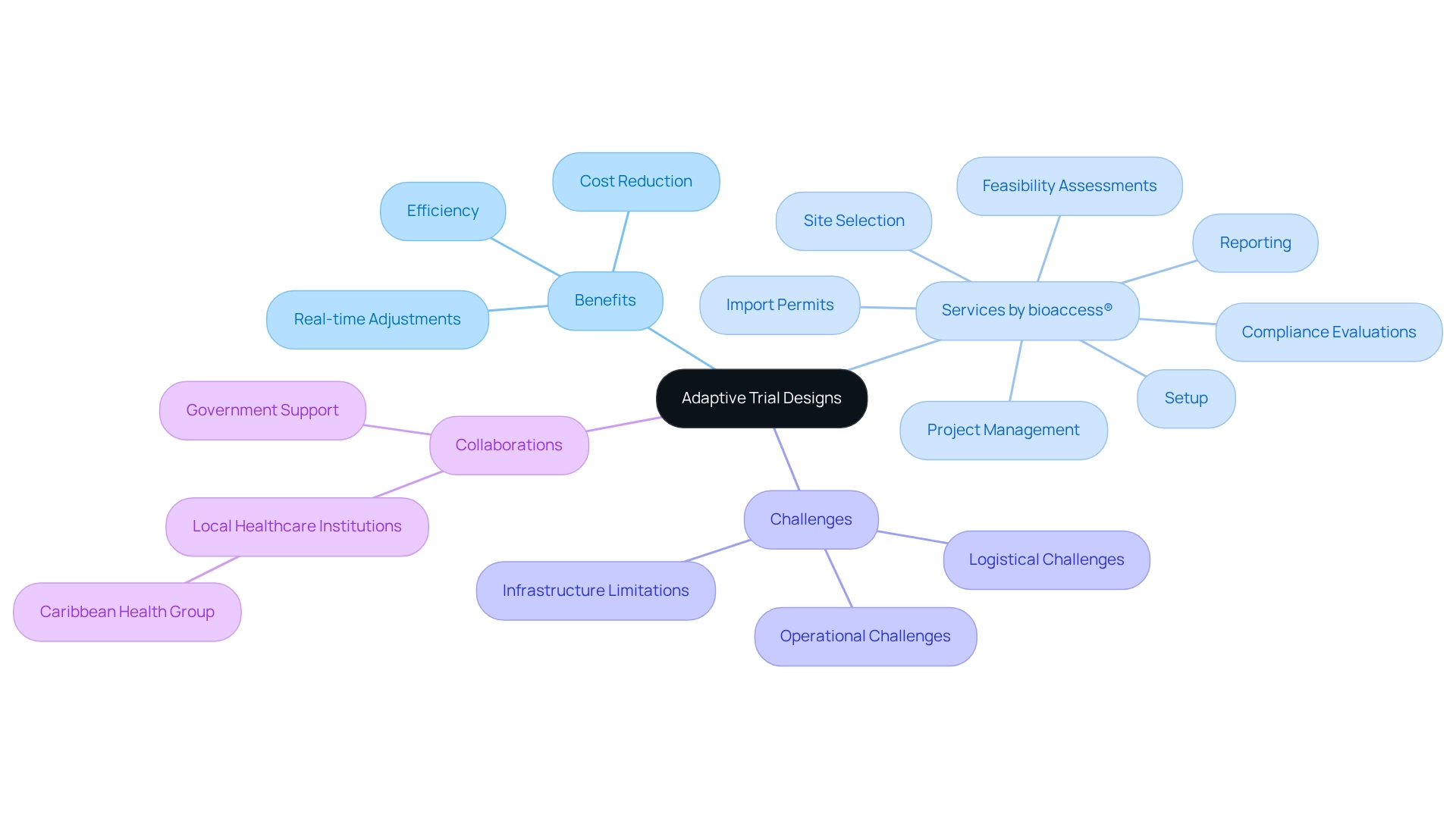
Early-Feasibility Studies (EFS): Validating Concepts Cost-Effectively
Early-Feasibility Studies (EFS) are essential in the development of new medical devices, allowing companies to validate concepts with minimal investment. These studies typically involve a limited participant group and concentrate on evaluating the safety and effectiveness of devices in real-world scenarios. By facilitating EFS, bioaccess® empowers Medtech startups to identify potential challenges early in the development process, significantly mitigating the risk of costly failures in subsequent stages. This strategic approach not only conserves financial resources but also expedites the journey to market for innovative medical technologies by utilizing cost-efficient trial designs for Ecuador.
Statistics indicate that early feasibility evaluations boast a higher success rate compared to traditional assessments, with research efforts since 2007 yielding promising outcomes. Additionally, the pass-through costs in clinical trials, which total approximately $8,526,728, highlight the financial implications of these studies, further underlining the need for cost-efficient trial designs for Ecuador.
Insights drawn from the case analysis of Avantec Vascular, which chose bioaccess® for its first-in-human clinical trial in Latin America, reveal ongoing challenges and strategies that enhance the development and testing of medical devices. This emphasizes the critical role of EFS in driving innovation. As Dr. Valentin Fuster, Editor-in-Chief, underscores, the advancement of EFS is vital for addressing patient needs and propelling medical technology forward.
As the industry progresses, the significance of cost-efficient trial designs for Ecuador in validating medical device concepts continues to escalate, highlighting their value in fostering innovation and improving patient care.
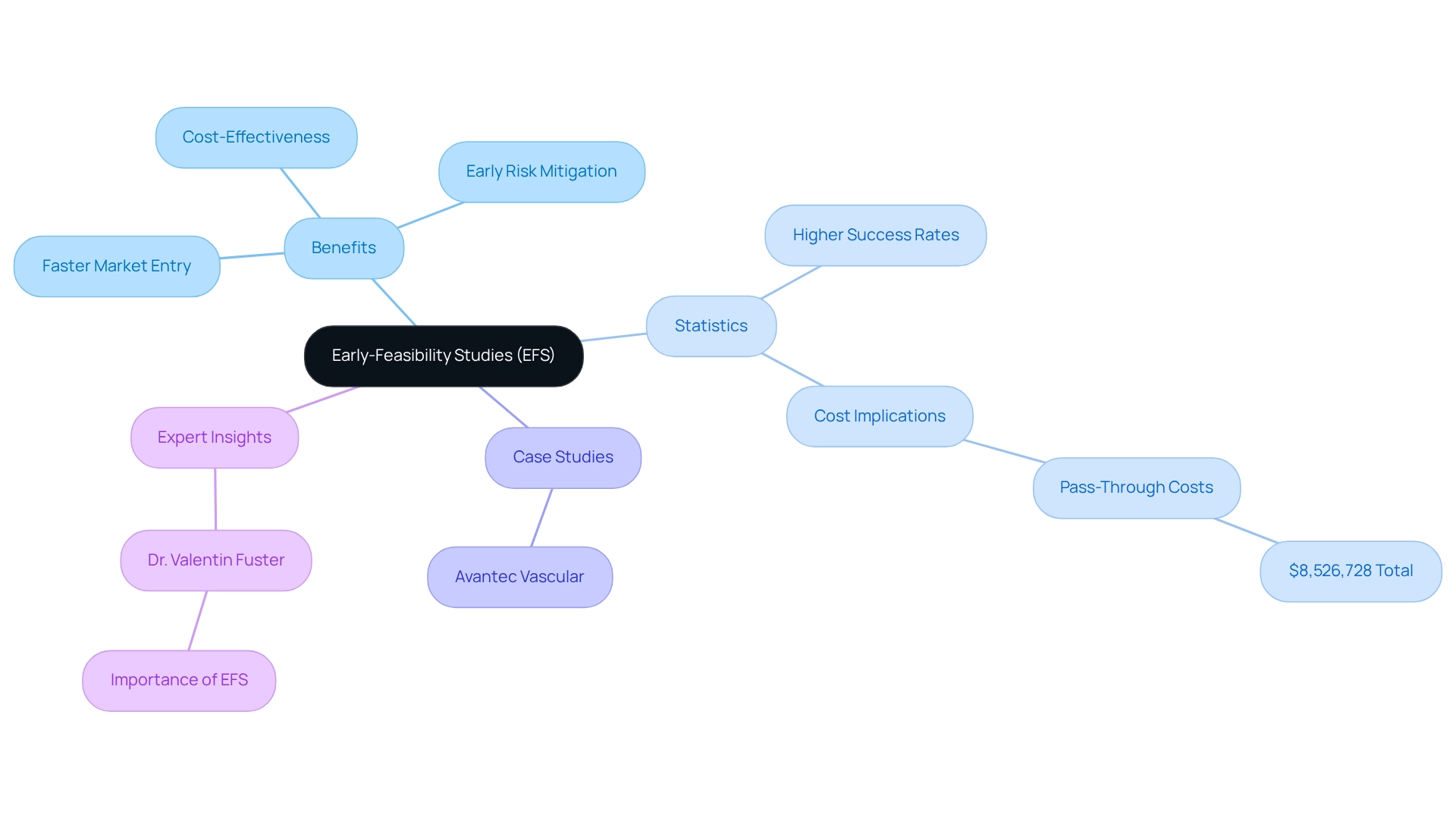
Pilot Studies: Minimizing Risks and Costs in Clinical Trials
Pilot experiments serve as essential small-scale evaluations designed to assess the feasibility, duration, cost, and potential negative outcomes associated with a research project. Through pilot projects, bioaccess® empowers Medtech companies to refine their protocols and identify logistical challenges prior to initiating larger trials. This proactive strategy significantly mitigates risks and expenses, thereby enhancing the likelihood of success for the primary research. For instance, a preliminary investigation can reveal obstacles related to patient recruitment or data collection methods, allowing researchers to implement necessary adjustments beforehand.
The financial advantages of pilot projects are particularly pronounced in the Medtech sector, where the stakes are high. By conducting these initial investigations, companies can avoid the pitfalls of larger trials that may be based on flawed assumptions or inadequate planning. Statistics reveal that the sample sizes required to achieve 80% power with a two-tailed t-test vary considerably based on effect size:
- 393 participants are needed for a 0.20 effect size
- 100 for a 0.40 effect size
- 64 for a 0.50 effect size
This underscores the importance of meticulous preparation in pilot projects to ensure valid and reliable results. As highlighted in the case analysis titled "Considerations in Determining Sample Size for Pilot Investigations," grasping the critical factors involved in determining sample size is vital for effective pilot project design.
Moreover, expert opinions emphasize that pilot experiments should remain distinct from data generated in subsequent larger analyses due to potential protocol modifications. Andrew C. Leon, Ph.D., from Weill Cornell Medical College, asserts, "A pilot investigation is not a hypothesis testing examination." Therefore, no inferential statistical tests should be proposed within a pilot project protocol, reinforcing the necessity for clarity in research design. Successful pilot experiments have demonstrated their ability to mitigate risks in Medtech investigations, providing a roadmap for the efficient execution of medical evaluations. In Ecuador, where the Medtech landscape is evolving, the strategic implementation of cost-efficient trial designs for Ecuador is crucial for navigating regulatory requirements and improving outcomes in 2025. Additionally, bioaccess® offers accelerated medical device research study services, which include Early-Feasibility Studies, First-In-Human Studies, Pilot Studies, Pivotal Studies, and Post-Market Follow-Up Studies, ensuring that Medtech companies can adeptly navigate the complexities of research in Latin America.
Decentralized Clinical Trials: Reducing Costs and Enhancing Engagement
Decentralized studies (DCTs) leverage digital technologies to facilitate remote research, enabling participants to engage from the comfort of their homes. This innovative approach not only enhances patient recruitment and retention but also results in significant cost reductions related to site visits and logistical challenges. By adopting DCTs, bioaccess® can improve the testing process, making it more accessible to a broader patient demographic.
Our comprehensive clinical study management services encompass:
- Feasibility assessments
- Site selection
- Compliance evaluations
- Study setup
- Import permits
- Project oversight
- Reporting
This ensures that studies are conducted efficiently and in compliance with regulatory standards. For instance, the implementation of remote monitoring tools and telehealth consultations allows for real-time data collection, significantly boosting efficiency while upholding rigorous data integrity standards.
Recent trends indicate that DCTs are gaining traction, with a notable shift towards patient-centric models that prioritize convenience; 45% of patients have expressed that a 'bring your own device' (BYOD) approach would enhance their experience. Currently, North America leads this sector, driven by regulatory advancements and a shift towards patient-focused studies.
The collaboration between bioaccess® and Caribbean Health Group aims to position Barranquilla as a key hub for medical research in Latin America, supported by Colombia's Minister of Health. The integration of cost-efficient trial designs for Ecuador is poised to transform medical studies, reducing costs and fostering increased patient engagement.
To fully realize the advantages of DCTs, it is essential to implement a robust communication strategy that keeps participants informed and engaged throughout the trial process. As noted by a Global Consulting Firm, 'Our company has been working with bioaccess® for some years now, and we are very pleased with the quality of the reports provided by the company.' This underscores the significance of high-quality medical research services in facilitating the growth of DCTs within the Medtech landscape.
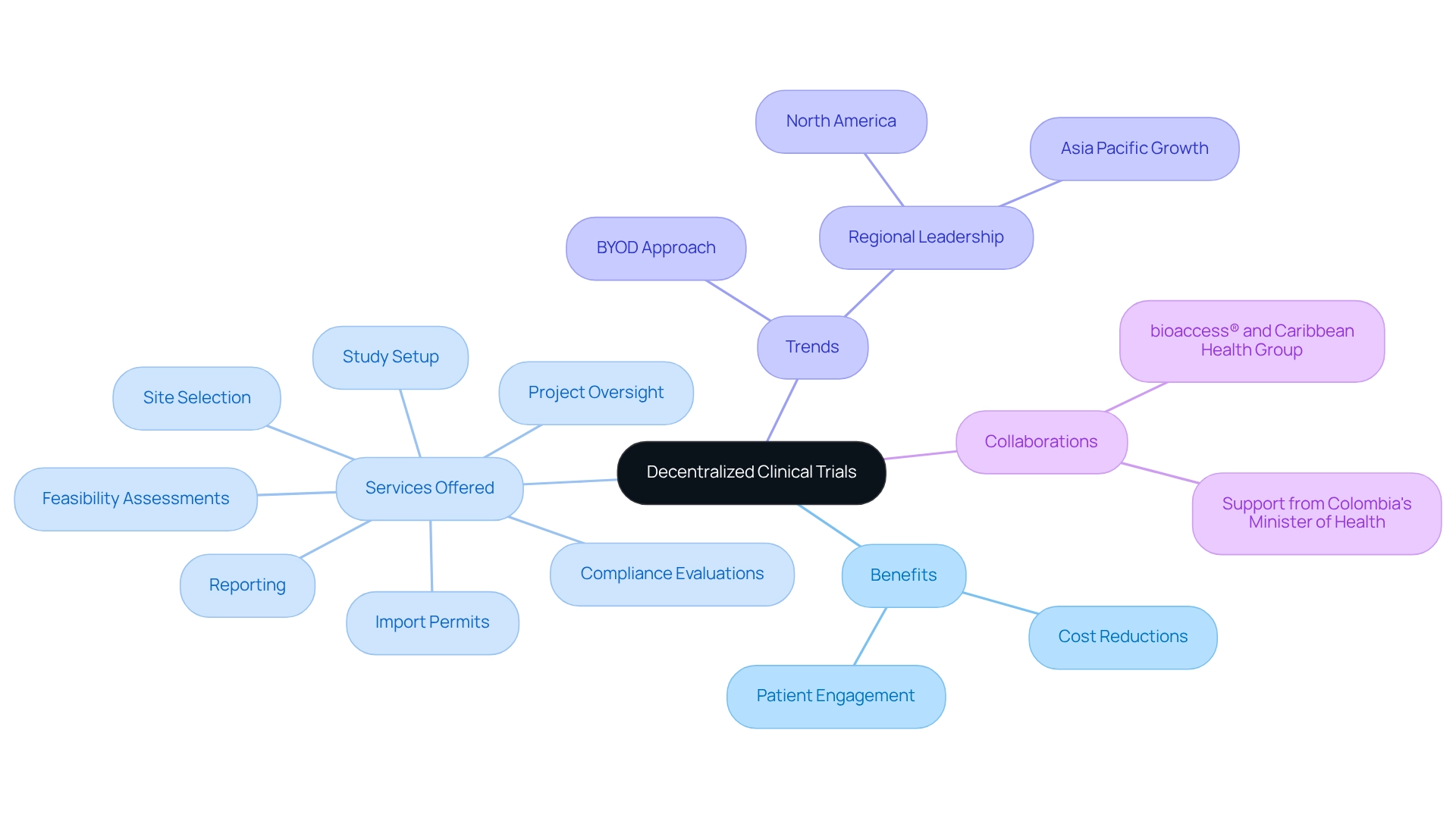
Real-World Evidence (RWE): Driving Cost-Effective Outcomes
Real-World Evidence (RWE) encompasses data gathered from actual healthcare environments, including electronic health records and patient registries. By integrating RWE into research designs, bioaccess® enhances the significance of study results and fortifies regulatory submissions. This strategic approach allows for the identification of patient populations most likely to benefit from new devices, thereby optimizing recruitment strategies and significantly reducing costs.
Furthermore, leveraging RWE provides a comprehensive perspective on a device's performance in everyday medical practice, facilitating more informed decision-making for stakeholders. As healthcare data volume doubles every two years, its integration is increasingly critical, especially within the context of Latin America's evolving Medtech landscape.
The FDA's approval of a medical device indication based solely on RWE in 2017 exemplifies the growing reliance on this data type, paving the way for more efficient and cost-effective regulatory practices. In 2025, ensuring alignment of baseline demographics and disease features remains essential for precise statistical evaluation of RWD, underscoring the importance of RWE in medical studies.
Expert insights affirm that the vast amounts of data collected today can significantly enhance research outcomes, with Kristin Kostka noting, "There’s more data being captured than we ever thought humanly possible," emphasizing RWE as a vital resource in the Medtech field.
Additionally, bioaccess®'s commitment to comprehensive research management services—including Early-Feasibility, First-In-Human, Pilot, Pivotal, and Post-Market Follow-Up evaluations—positions it as a trusted CRO and consulting ally for U.S. medical device firms in Colombia, ultimately contributing to job creation, economic development, and healthcare improvement in the region.
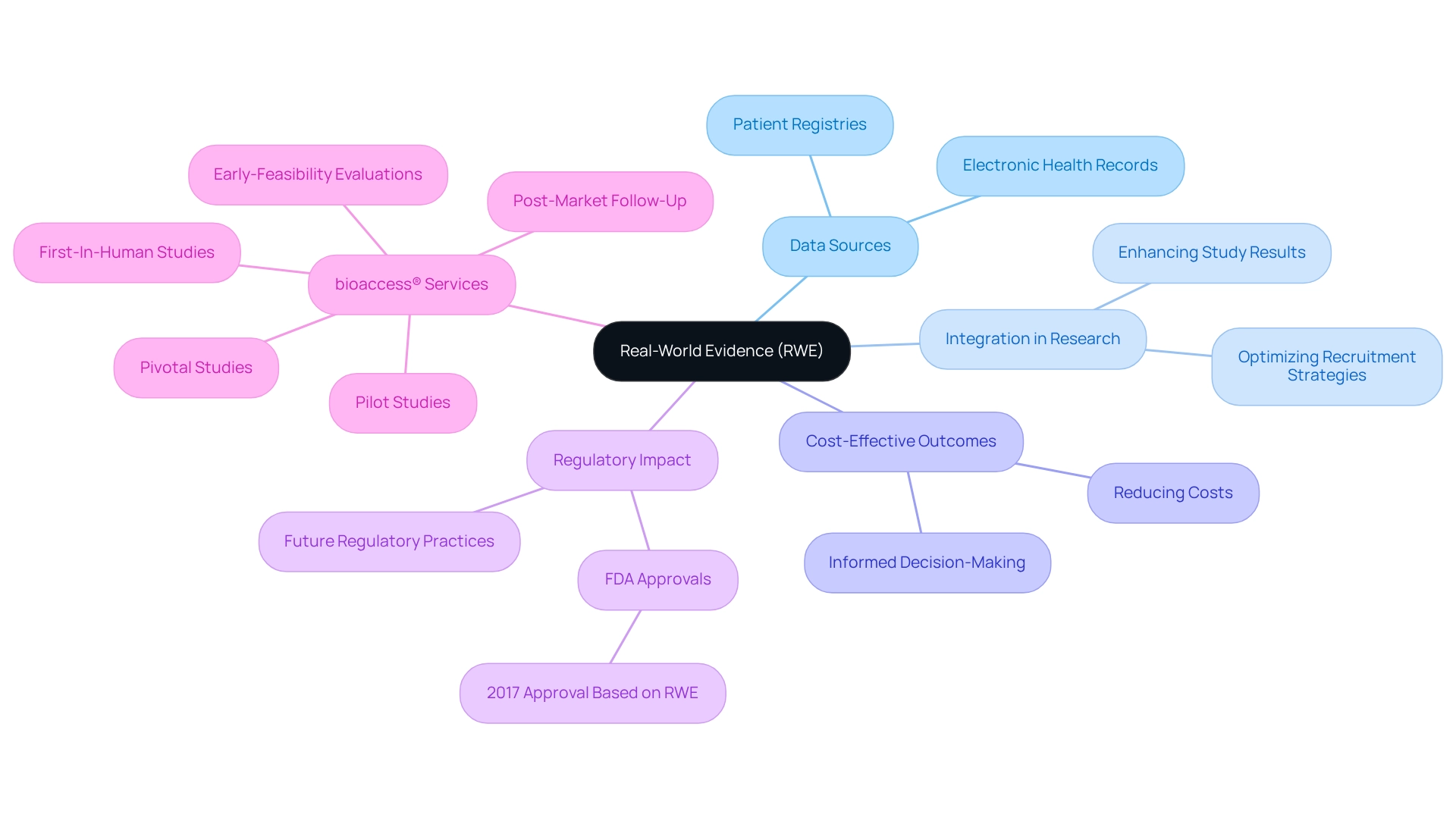
Streamlined Regulatory Pathways: Reducing Time and Costs
Navigating the regulatory environment is crucial for the success of medical studies, particularly in the Medtech field. Streamlined regulatory pathways significantly reduce both time and costs associated with bringing innovative medical devices to market. Bioaccess® excels in guiding Medtech companies through the regulatory approval process in Colombia, facilitating the acquisition of IRB/EC approval, INVIMA approval, and MinCIT import permits. Leveraging its extensive expertise, Bioaccess® helps clients avoid common pitfalls that often lead to delays and increased expenses.
The partnership between Bioaccess® and Caribbean Health Group aims to establish Barranquilla as a prominent hub for medical research in Latin America, supported by Colombia's Minister of Health. Furthermore, the integration of adaptive experimental designs allows for adjustments to research protocols based on interim data analysis, enhancing resource allocation and decision-making efficiency. Bioaccess® also offers comprehensive research management services, including:
- Feasibility studies
- Site selection
- Compliance evaluations
- Study setup
- Project oversight
- Monitoring of serious and non-serious adverse events
This ensures a thorough and efficient process for advancing medical device studies.
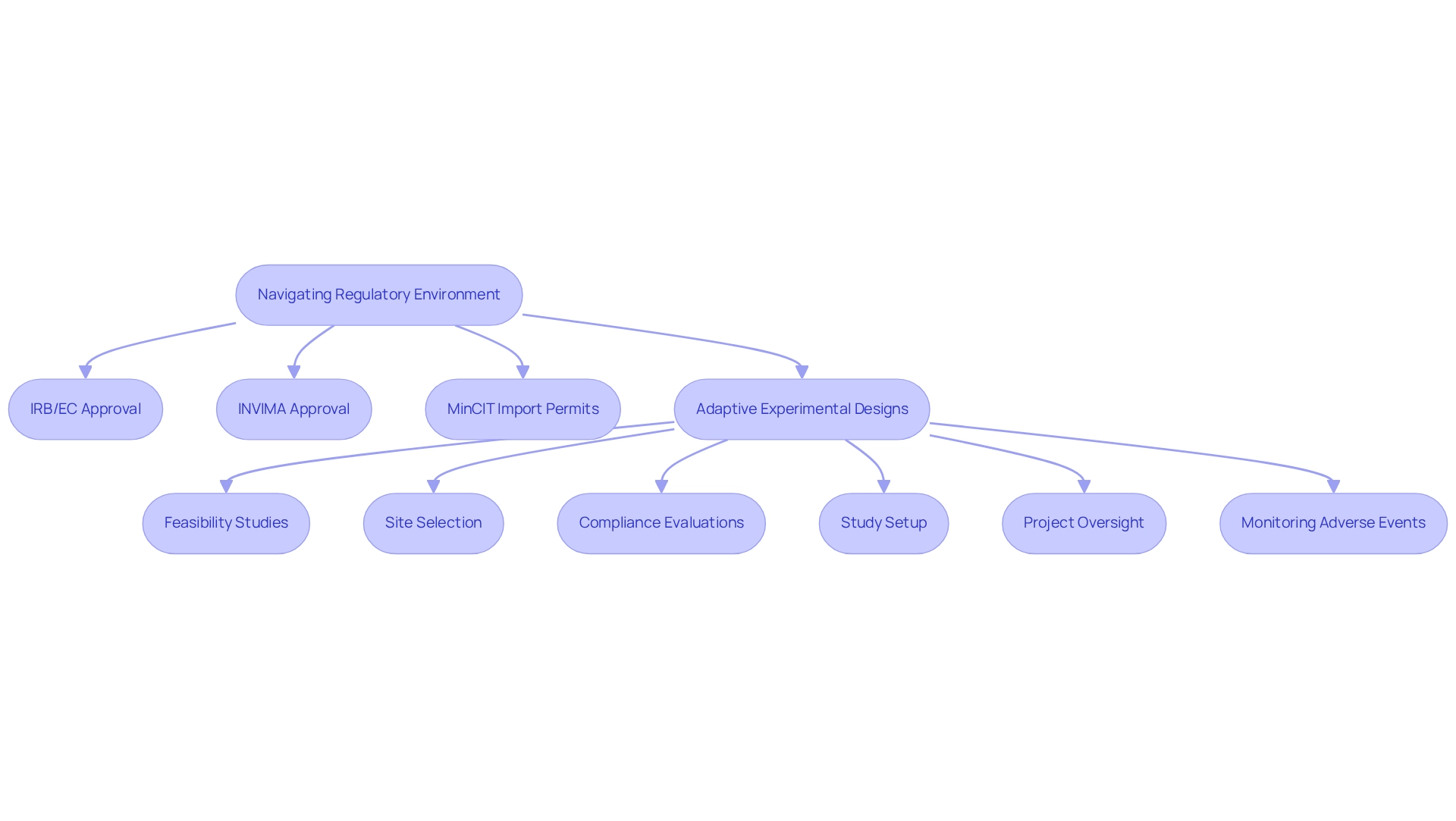
Technology Integration: Enhancing Efficiency and Reducing Costs
The incorporation of technology into medical studies is fundamentally altering research methodologies. bioaccess® utilizes advanced data management systems, electronic data capture (EDC), and remote monitoring tools to significantly improve efficiency in studies. With over 20 years of experience in Medtech, bioaccess® specializes in comprehensive research management services, including:
- Early-Feasibility Studies
- First-In-Human Studies
- Post-Market Follow-Up Studies
- Compliance reviews
- Project management
EDC systems facilitate real-time data entry and analysis, minimizing errors and accelerating decision-making processes, thereby reducing the administrative burden on research teams. For instance, Kerecis, a medical device company, faced challenges with traditional paper-based data collection methods, prompting them to transition to an EDC system. This change led to enhanced data precision and simplified research processes, emphasizing the significance of embracing contemporary solutions in the sector.
Moreover, bioaccess®'s partnership with Caribbean Health Group seeks to establish Barranquilla as a top destination for research studies in Latin America, backed by Colombia's Minister of Health. This initiative not only boosts the region's attractiveness for medical studies but also aids in cost efficiency by shortening recruitment periods and enhancing retention rates.
By embracing these technological advancements, bioaccess® provides Medtech companies with cost-efficient trial designs for Ecuador, offering a more efficient and cost-effective method for medical studies, ultimately improving patient care and accelerating the route to market. Notably, the investment in EDC systems pays for itself by accelerating research processes and improving patient care, reinforcing the argument for technology integration.
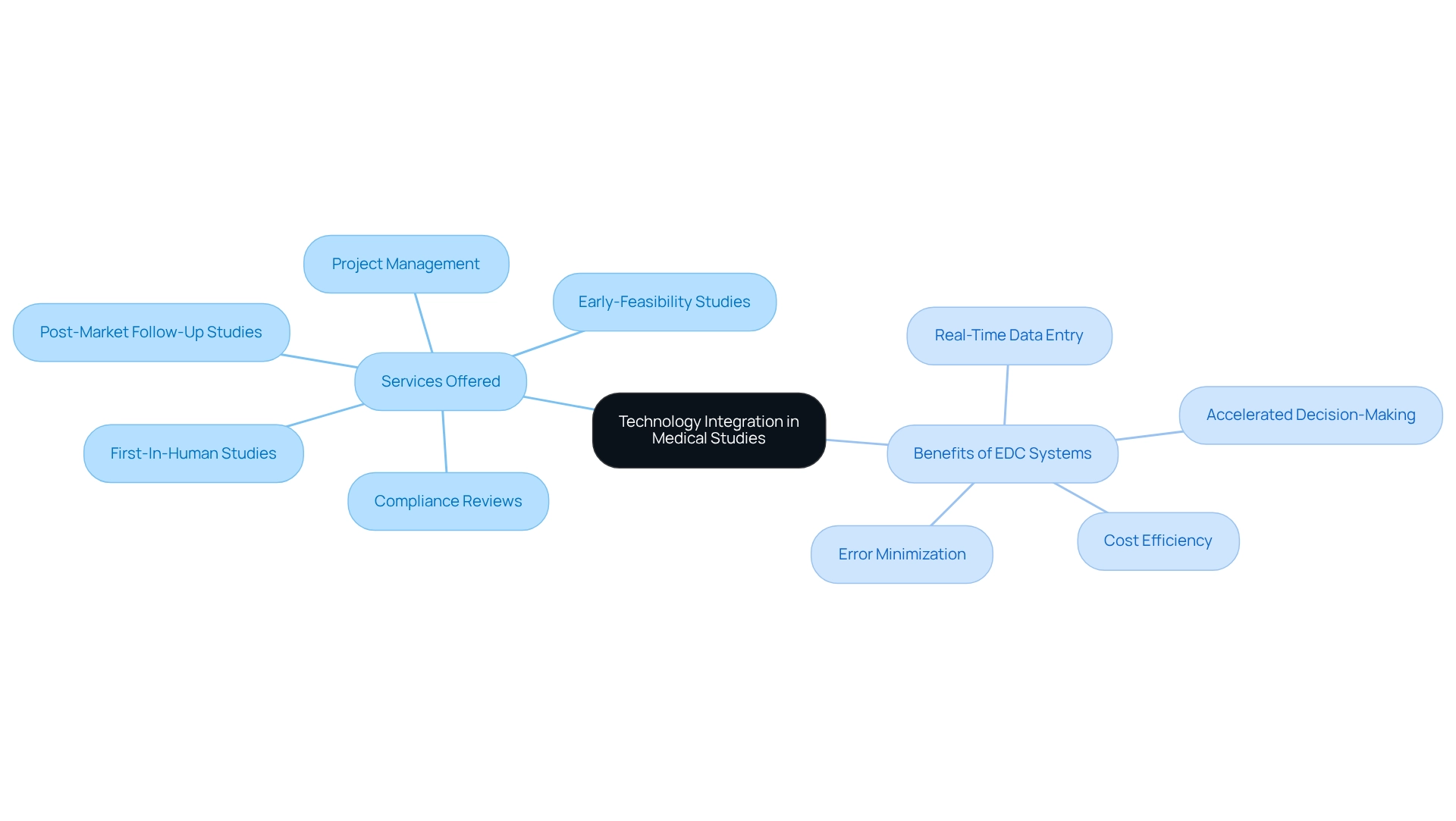
Collaboration with Local Institutions: Leveraging Resources for Cost Efficiency
Collaboration with regional organizations, such as universities and healthcare centers, is vital for enhancing the efficiency of clinical studies through cost-efficient trial designs for Ecuador. bioaccess® prioritizes partnerships with these entities to leverage their resources, expertise, and patient populations. These collaborations not only facilitate shared expenses but also refine recruitment strategies that are essential for the successful execution of cost-efficient trial designs for Ecuador.
For instance, partnering with a local university can grant access to advanced research facilities and a diverse pool of qualified participants, which contributes to cost-efficient trial designs for Ecuador while simultaneously improving the quality of the research. Statistics indicate that site monitoring expenses alone account for 9% to 14% of total research expenditures, underscoring the financial benefits of strategic partnerships.
Furthermore, successful collaborations between Medtech firms and academic institutions demonstrate that harnessing local knowledge can lead to cost-efficient trial designs for Ecuador, innovative study designs, and enhanced patient involvement, ultimately resulting in reduced costs and an accelerated path to commercialization.
In Colombia, the alliance between bioaccess™ and Caribbean Health Group aims to position Barranquilla as a premier location for clinical research, with backing from the Minister of Health, further illustrating the potential for cost-effectiveness and regulatory efficiency in the region.
It is crucial to understand the full spectrum of expenses associated with the examination, as highlighted in the case analysis 'Limitations of Cost Estimates,' which emphasizes the need for further research in this area. Additionally, a strategic approach to patient recruitment is essential for improving enrollment rates, reinforcing the significance of collaboration with local institutions.
bioaccess offers comprehensive services, including project management and oversight, regulatory compliance, and thorough reporting, to ensure successful research outcomes.
Continuous Monitoring and Adaptive Strategies: Ensuring Cost Efficiency
Continuous monitoring in clinical studies is crucial for the ongoing evaluation of data and participant safety throughout the research process. By employing adaptive strategies informed by real-time data, bioaccess® significantly enhances efficiency while simultaneously reducing costs.
With over 20 years of experience in Medtech, bioaccess® offers extensive management services for studies, including:
- Feasibility assessments
- Site selection
- Compliance evaluations
- Setup
- Import permits
- Project management
- Reporting
For example, if monitoring reveals unforeseen negative occurrences, the study protocol can be swiftly modified to prioritize participant safety and uphold data integrity. This proactive approach not only safeguards participants but also mitigates the risk of costly delays or failures, ultimately leading to more successful outcomes.
As James M S Wason highlights, any manufacturing step may introduce delays of two to three months before modifications can be implemented, underscoring the critical need for timely adjustments in testing protocols.
The implementation of cost-efficient trial designs for Ecuador has been shown to significantly impact research costs, with studies indicating that efficient monitoring can reduce total spending by as much as 30%. Furthermore, the introduction of tools such as the R package 'stoppingrule' facilitates the creation and comparison of stopping rules, allowing for more adaptable study designs that can respond to real-time data. This capability underscores the importance of customized approaches in medical studies, as the selection of parameters in these adaptive strategies can greatly influence the effectiveness of safety monitoring techniques.
Additionally, bioaccess®'s collaboration with Caribbean Health Group aims to position Barranquilla as a premier destination for clinical trials in Latin America, focusing on cost-efficient trial designs for Ecuador, bolstered by support from Colombia's Minister of Health, further enhancing the region's attractiveness for efficient and cost-effective clinical research.
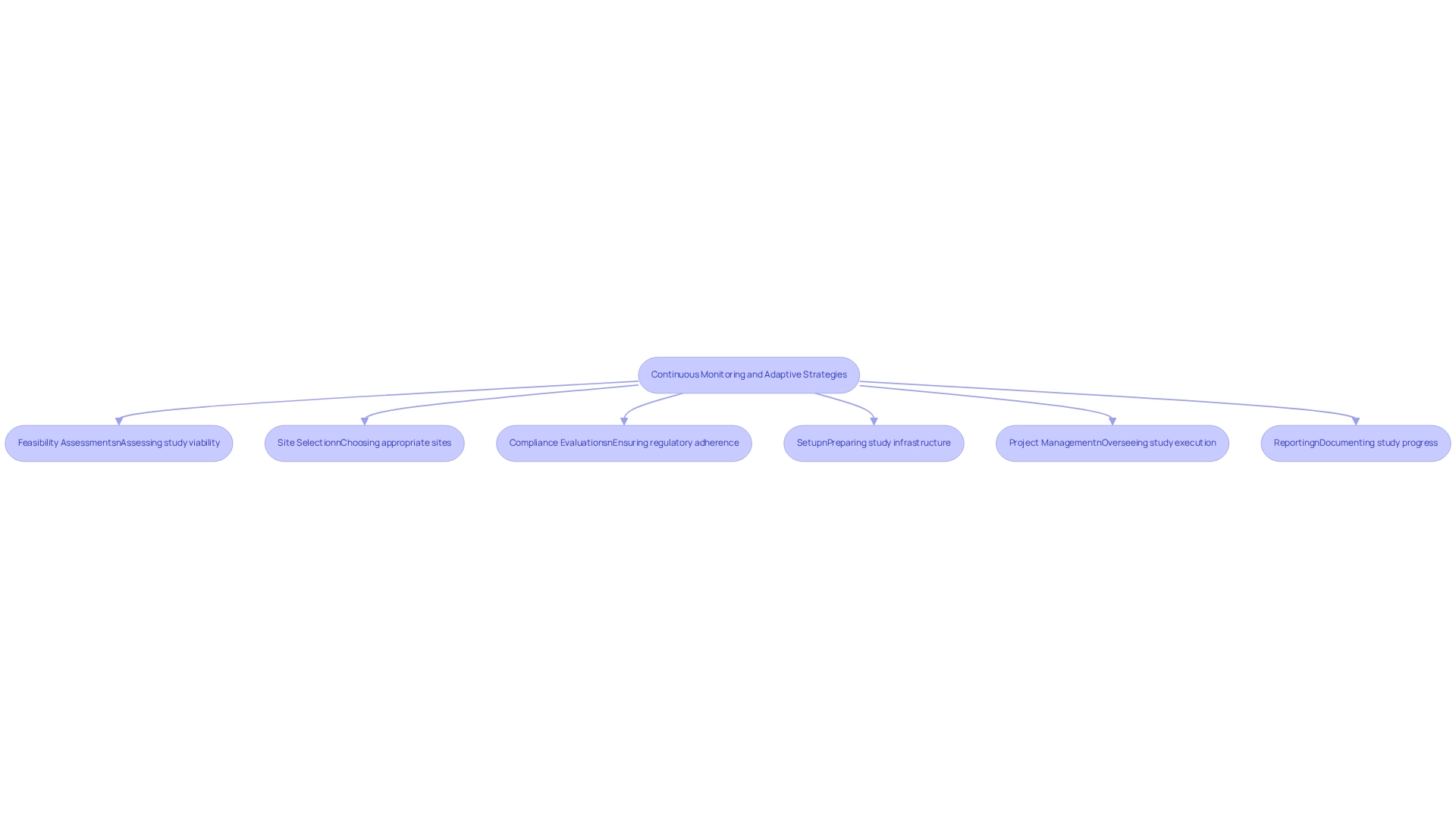
Conclusion
Ecuador is establishing itself as a pivotal player in the Medtech sector, driven by bioaccess®'s innovative and cost-efficient clinical trial solutions. By employing adaptive trial designs, early-feasibility studies, pilot studies, and decentralized clinical trials, bioaccess® is streamlining the research process. This approach not only significantly reduces costs but also enhances the quality of clinical outcomes. With a profound understanding of local regulatory frameworks and over 15 years of experience, bioaccess® effectively navigates the complexities of clinical studies, positioning Ecuador as an attractive destination for Medtech companies.
The integration of technologies such as real-world evidence and electronic data capture is further transforming the clinical trial landscape, enabling more informed decision-making and efficient trial management. Through collaboration with local institutions and the strategic use of resources, bioaccess® maximizes the potential for successful trials while minimizing financial burdens. The focus on continuous monitoring and adaptive strategies ensures that clinical trials remain responsive, prioritizing participant safety and data integrity.
In conclusion, bioaccess® is at the forefront of redefining clinical research in Ecuador, significantly contributing to the advancement of medical devices and improving healthcare outcomes. As the global demand for clinical trial services continues to rise, organizations like bioaccess® play a crucial role in driving innovation and efficiency within the Medtech sector, ultimately benefiting patients and healthcare systems alike. The future of clinical research in Latin America appears promising, with bioaccess® leading the way toward a more effective and cost-efficient paradigm.
Frequently Asked Questions
What is bioaccess®'s role in Ecuador's Medtech environment?
bioaccess® has established itself as a leader in Ecuador's Medtech environment by focusing on cost-efficient trial designs tailored to the needs of medical technology firms, leveraging over 15 years of experience and extensive knowledge of local regulatory frameworks to expedite the development of medical devices.
How does bioaccess® contribute to cost-efficient trial designs?
bioaccess® enhances the quality and speed of medical studies while reducing costs, making Ecuador an appealing destination for Medtech firms looking to conduct medical evaluations.
What is the projected growth of the global contract organization (CRO) market?
The global CRO market is projected to grow from approximately $40 billion in 2020 to more than $60 billion by 2024, indicating a significant increase in demand for medical testing services across various sectors, including Medtech.
What challenges does Ecuador face in the Medtech sector?
While there are challenges such as regulatory hurdles in countries like Chile, Ecuador's regulatory environment is evolving to become more favorable for Medtech evaluations.
What partnerships has bioaccess® formed to enhance its services?
bioaccess® collaborates with partners like Welwaze Medical Inc. for the Celbrea® launch and GlobalCare Clinical Trials to enhance ambulatory services, achieving significant reductions in recruitment times and high retention rates.
What are adaptive study designs and their benefits?
Adaptive study designs allow researchers to make real-time adjustments to study protocols based on interim data, enhancing the efficiency of clinical studies by potentially reducing costs, minimizing participant numbers, and shortening study durations.
What services does bioaccess® offer for clinical studies?
bioaccess® provides comprehensive management services for studies, including feasibility assessments, site selection, compliance evaluations, setup, import permits, project management, and reporting.
What are Early-Feasibility Studies (EFS) and their importance?
EFS are crucial for the development of new medical devices, allowing companies to validate concepts with minimal investment and evaluate safety and effectiveness in real-world scenarios, thereby mitigating risks of costly failures in later stages.
How do EFS compare to traditional assessments?
Early feasibility evaluations generally have a higher success rate compared to traditional assessments, with research since 2007 demonstrating promising outcomes.
What is the significance of cost-efficient trial designs for Ecuador?
Cost-efficient trial designs are vital for validating medical device concepts, fostering innovation, and improving patient care, thereby playing a critical role in the advancement of medical technology in Ecuador.




